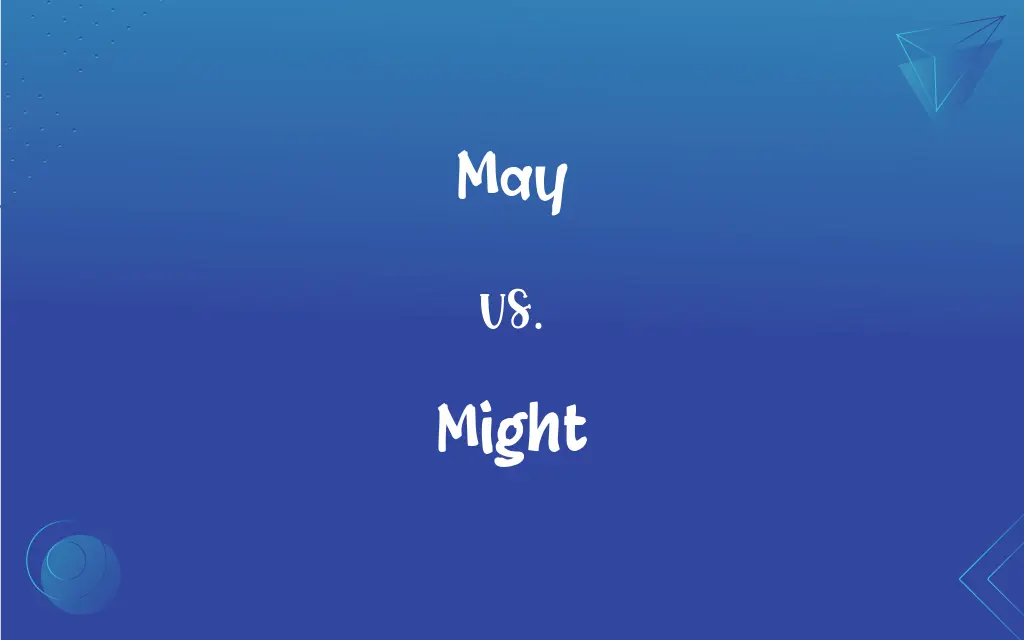May vs. Might: What's the Difference?
Edited by Harlon Moss || By Janet White || Published on November 2, 2023
"May" suggests a higher possibility or permission, "Might" implies a lower possibility or hypotheticals. Both indicate uncertainty.

Key Differences
"May" often indicates a greater likelihood of something happening, while "Might" is used for a significantly lesser chance or a hypothetical situation. Both words, however, communicate a sense of uncertainty.
When it comes to expressing permission, "May" is the more traditional and formal choice, whereas "Might" is rarely used in this context. Both can denote possibility, but "May" is more commonly used for permissions.
In terms of grammatical mood, "May" is used in the indicative mood to imply a real possibility, while "Might" is used in the subjunctive mood for unreal or hypothetical situations. Both help to set the mood of a sentence.
"May" and "Might" are both modal verbs in English, but "May" is often used in more formal contexts, while "Might" is seen as more informal and speculative. Both, however, are central to expressing degrees of uncertainty.
"May" has a present or future focus, suggesting something that's possible now or later, whereas "Might" has a past implication, often indicating a missed opportunity or hypothetical. Both offer temporal nuances to a sentence.
ADVERTISEMENT
Comparison Chart
Likelihood
Higher possibility
Lower possibility
Permission
Commonly used
Rarely used
Formality
More formal
Less formal, more speculative
Grammatical Mood
Indicative mood
Subjunctive mood
Time Connotation
Present or future focus
Often used for past or hypotheticals
ADVERTISEMENT
May and Might Definitions
May
Indicates a wish or a hope.
May you have a happy birthday!
Might
Used as the past tense of "may" in indirect speech.
She said she might come by later.
May
Suggests potentiality.
With more practice, you may master the piano.
Might
Expresses annoyance or emphasis in a question.
How might one solve this issue?
May
Denotes concession.
He may be strong, but he lacks endurance.
Might
Indicates a lower possibility.
It might snow on the weekend.
May
A hawthorn or its blossoms.
Might
Suggests a hypothetical situation.
If I had studied, I might have passed the test.
May
The fifth month of the year in the Gregorian calendar. See Table at calendar.
Might
Implies a polite suggestion or modesty.
You might want to reconsider your decision.
May
The springtime of life; youth.
Might
Great power or force, as of a nation or army.
May
The celebration of May Day.
Might
Physical strength
Push with all your might!.
May
To be strong; to have power (over).
Might
Power, strength, force or influence held by a person or group.
May
To be able; can.
Might
(uncountable) Physical strength or force.
He pushed with all his might, but still it would not move.
May
To be able to go.
Might
(uncountable) The ability to do something.
May
To have permission to, be allowed. Used in granting permission and in questions to make polite requests.
You may smoke outside;
May I sit there?
Might
(obsolete) Mighty; powerful.
May
Expressing a present possibility; possibly.
He may be lying;
Schrödinger's cat may or may not be in the box
Might
(obsolete) Possible.
May
Expressing a wish (with present subjunctive effect).
May you win;
May the weather be sunny
Might
(auxiliary) Used to indicate conditional or possible actions.
I might go to the party, but I haven't decided yet.
May
Used in modesty, courtesy, or concession, or to soften a question or remark.
Might
(auxiliary) may Used to indicate permission in past tense.
He asked me if he might go to the party, but I haven't decided yet.
May
To gather may, or flowers in general.
Might
(auxiliary) may Used to indicate possibility in past tense.
I thought that I might go the next day.
May
To celebrate May Day.
Might
Used to indicate a desired past action that was not done.
Hey man, you might have warned me about the thunderstorm.
May
The hawthorn bush or its blossoms.
Might
(auxiliary) Even though.
I might be in a wheelchair, but I still want to be treated as a lady.
May
(archaic) A maiden.
Might
(auxiliary) Used in polite requests for permission
Might I take the last biscuit?
May
An auxiliary verb qualifying the meaning of another verb,
How may a man, said he, with idle speech,Be won to spoil the castle of his health!
For what he [the king] may do is of two kinds; what he may do as just, and what he may do as possible.
For of all sad words of tongue or penThe saddest are these: "It might have been."
Might
Used to express certainty.
Yeah, I think we might need something a bit sturdier.
May
Liberty; permission; allowance.
Thou mayst be no longer steward.
Might
Force or power of any kind, whether of body or mind; energy or intensity of purpose, feeling, or action; means or resources to effect an object; strength; force; power; ability; capacity.
What so strong,But wanting rest, will also want of might?
Thou shalt love the Lord thy God with all thine heart, and with all thy soul, and with all thy might.
May
Contingency or liability; possibility or probability.
Though what he learns he speaks, and may advanceSome general maxims, or be right by chance.
Might
Physical strength
May
Modesty, courtesy, or concession, or a desire to soften a question or remark.
How old may Phillis be, you ask.
May
Desire or wish, as in prayer, imprecation, benediction, and the like.
May
A maiden.
May
The fifth month of the year, containing thirty-one days.
May
The early part or springtime of life.
His May of youth, and bloom of lustihood.
May
The flowers of the hawthorn; - so called from their time of blossoming; also, the hawthorn.
The palm and may make country houses gay.
Plumes that mocked the may.
May
The merrymaking of May Day.
May
The month following April and preceding June
May
Thorny Eurasian shrub of small tree having dense clusters of white to scarlet flowers followed by deep red berries; established as an escape in eastern North America
May
Expresses possibility.
It may rain tomorrow.
May
Used to ask for permission.
May I borrow your book?
FAQs
Can "may" and "might" be used interchangeably?
Often yes, but "may" suggests higher likelihood or formality.
Is "may" more formal than "might"?
Yes, "may" is traditionally more formal.
Can "may" express a wish?
Yes, e.g., "May you live happily!"
Does "might" suggest hypotheticals?
Yes, it's often used for hypothetical situations.
Can "might" be used for permission?
Rarely, "may" is standard for granting or asking permission.
Does "might" imply a lesser chance than "may"?
Yes, it typically suggests a lower possibility.
Do "may" and "might" have different grammatical moods?
Yes, "may" is indicative, and "might" is subjunctive.
Is "might" used for polite suggestions?
Yes, it softens the tone of suggestions.
Are there exceptions in using "may" and "might"?
Usage can vary based on context and dialect.
Can "might" express annoyance?
Yes, in rhetorical questions for emphasis.
Is "may" used for current possibilities?
Yes, it's for present or future possibilities.
Does "might" imply missed opportunities?
Often, especially in the context of past events.
Is "might" past tense?
It's used as past tense of "may" in indirect speech.
Can "may" suggest a concession?
Yes, as in "He may be fast, but..."
Do "may" and "might" have the same origin?
They both stem from Old English.
How does time affect "may" vs "might"?
"May" often has a present/future focus; "might" can imply past/hypotheticals.
Are "may" and "might" modal verbs?
Yes, both are modals indicating possibility.
Can "may" deny permission?
Yes, as in "You may not enter."
Can "might" be used for future possibilities?
Less commonly, but it's possible in conjectures.
Is "may" ever used in the subjunctive mood?
Rarely, it's typically indicative.
About Author
Written by
Janet WhiteJanet White has been an esteemed writer and blogger for Difference Wiki. Holding a Master's degree in Science and Medical Journalism from the prestigious Boston University, she has consistently demonstrated her expertise and passion for her field. When she's not immersed in her work, Janet relishes her time exercising, delving into a good book, and cherishing moments with friends and family.
Edited by
Harlon MossHarlon is a seasoned quality moderator and accomplished content writer for Difference Wiki. An alumnus of the prestigious University of California, he earned his degree in Computer Science. Leveraging his academic background, Harlon brings a meticulous and informed perspective to his work, ensuring content accuracy and excellence.







































































